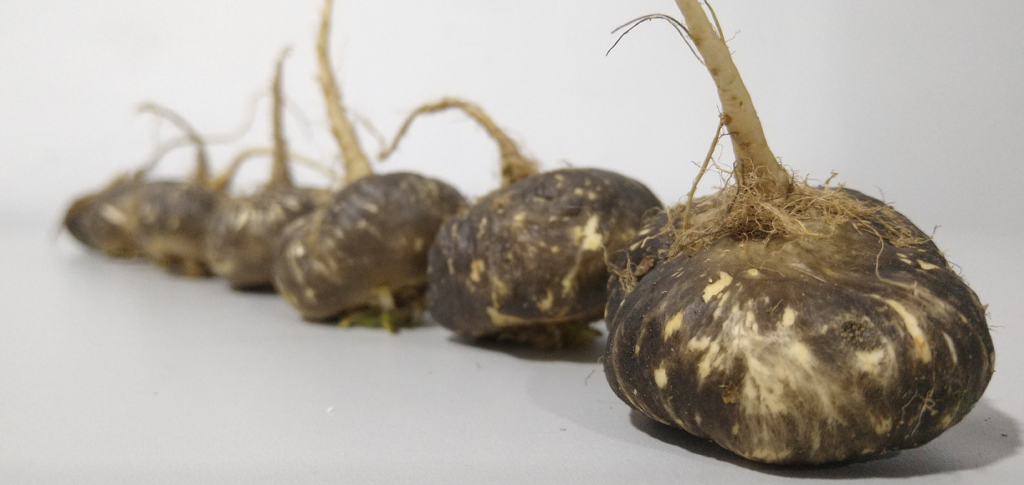Studies have found Black Maca to have the greatest effect on sperm production when compared with Yellow and Red Maca.
Lepidium meyenii Walp., a cruciferous vegetable known as Maca, grows exclusively between 4000 and 4500 m above sea level in the central Peruvian Andes, particularly in Junin plateau. Anecdotal evidence claims that this plant enhances fertility (1), and previous experimental studies have demonstrated the traditional fertility-enhancing properties of the hypocotyls of Maca in biological models (2–6) and in humans without affecting the levels of serum testosterone, luteinizing hormone (LH), or follicle stimulating hormone (FSH) (7).

Different varieties of Maca have been described according to the color of its hypocotyls (8, 9). Previous studies have demonstrated that Red, Yellow, and Black Maca show differences in their nutritional components (9). For instance, Red Maca has a higher content of pure protein and potassium, and lower content of soluble direct reducing sugars, riboflavin, and iron than Black Maca, whereas Yellow Maca has intermediate values for these compounds (9). Accordingly, different biologic properties have been observed among the Black, Yellow, and Red varieties of Maca (10, 11).
For instance, there is evidence that the Black variety of Maca has more beneficial effects on spermatogenesis (11) and learning (12) than the yellow or red variety. Red Maca can reduce prostate size in biological models with experimentally induced benign prostate hyperplasia (10). Because previous studies have found Black Maca to have the greatest effect on sperm production when compared with Yellow and Red Maca.
- Cobo B. History of the New World. de Mateos F, ed. Madrid: Ediciones Atlas, 1956.
- Gonzales GF, Ruiz A, Gonzales C, Villegas L, Cordova A. Effect of Lepidium meyenii (Maca) roots on spermatogenesis of male rats. Asian J Androl 2001;3:231–3.
- Gonzales GF, Gasco M, Córdova A, Chung A, Rubio J, Villegas L. Effect of Lepidium meyenii (Maca) on spermatogenesis in male rats acutely exposed to high altitude (4340 m). J Endocrinol 2004;180:87–95.
- Cicero AFG, Bandiere E, Arletti R. Lepidium meyenii Walp improves sexual behaviour in male rats independently from its action on spontaneous locomotor activity. J Ethnopharmacol 2001;75:225–9.
- Chung F, Rubio J, Gonzales C, Gasco M, Gonzales GF. Dose-response effects of Lepidium meyenii (Maca) aqueous extract on testicular function and weight of different organs in adult rats. J Ethnopharmacol 2005;98:143–7.
- Rubio J, Riqueros MI, Gasco M, Yucra S, Miranda S, Gonzales GF. Lepidium meyenii (Maca) reversed the lead acetate induced-damage on reproductive function in male rats. Food Chem Toxicol 2006;44:1114–22.
- Gonzales GF, Córdova A, Gonzales C, Chung A, Vega K, Villena A. Improved sperm count after administration of Lepidium meyenii (Maca) in adult men. Asian J Androl 2001;3:301–4.
- Tello J, Hermann M, Calderón A. La Maca (Lepidium meyenii Walp.) cultivo alimenticio potencial para las zonas altoandinas. Boletín Lima 1992;14:59.
- Yllescas M. Estudio químico y Fisicoquímico de tres ecotipos de Lepidium meyenii procedentes de Carhuamayo. Lima, Peru: Facultad de Farmacia y Bioquímica, Universidad Nacional Mayor de San Marcos, 1994.
- Gonzales GF, Miranda S, Nieto J, Fernandez G, Yucra S, Rubio J, et al. Red Maca (Lepidium meyenii) reduced prostate size in rats. Reprod Biol Endocrinol 2005;3:5.
- Gonzales GF, Nieto J, Rubio J, Gasco M. Effect of Black Maca (Lepidium meyenii) on one spermatogenic cycle in rats. Andrologia 2006;38: 166–72.
- Rubio J, Caldas M, Dávila S, Gasco M, Gonzales GF. Effect of three different cultivars of Lepidium meyenii (Maca) on learning and depression in ovariectomized mice. BMC Complement Altern Med 2006;6:23.